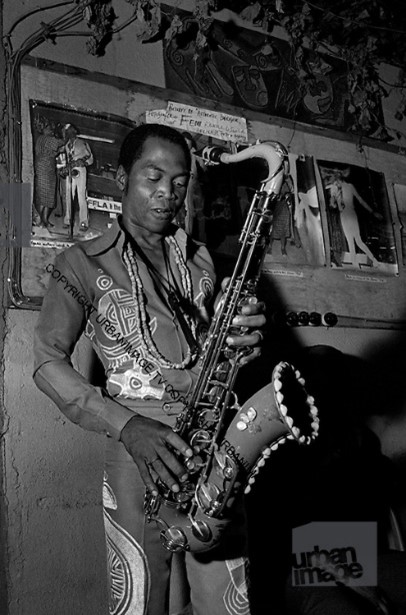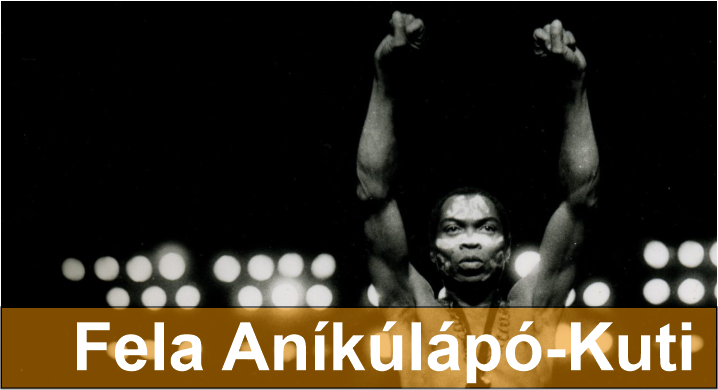Olufela Olusegun Oludotun Ransome-Kuti was an iconic musician and political activist whose career spanned the late fifties to early nineties. He was born on the 15th day of October 1938 in Abeokuta, Ogun State, Nigeria.
Early Life
Fela, as he was mononymously known, was the third child of a prominent Egba family notable for their contributions to music, religion, medicine, education, and politics in Nigeria. His father, Israel Oludotun Ransome-Kuti, was a renowned Reverend and teacher who was the first president of the Nigerian Union of Teachers.
His mother, Chief Fumilayo Ransome-Kuti, was an anti-colonial suffragist and the first woman to attend Abeokuta Grammar School. His brothers Olikoye Ransome-Kuti and Bekolari Ransome-Kuti were notable doctors. Given this background of solid characters and a spirit of change-driving, it is no surprise that Fela took the path of greatness.
He began his education at Abeokuta Grammar School after taking music lessons on the piano and percussion from his father. He then went to the United Kingdom; his parents hoped he would become a medical doctor like his brothers, but the young Fela had other dreams.
Career
Upon getting to the United Kingdom, Fela chose to study classical music at Trinity College of Music, London. He was exposed to various musical genres such as jazz and rock and soon formed his band, which he called Koola Lobitos. His preference was the trumpet, and he was a favourite at clubs in London.
When he returned to Nigeria in the sixties, he rebranded his style of music into a complex combination of sorts – highlife, jazz, funk, salsa, calypso, and traditional Yoruba music – which he then dubbed "Afrobeat." Thus began the rise of the genre for generations to come.
Fela and his band went on numerous tours around America. On one such tour, he met Sandra Smith (now Sandra Izsadore). Izsadore's influence on Fela was monumental, as he was recorded to have said after meeting her:
“It was incredible how my head was turned. Everything fell into place, man. For the first time, I saw the essence of blackism (black nationalism). It's crazy; in the States, people think the black‐power movement drew inspiration from Africa. All these Americans come over here looking for awareness. They don't realize they're the ones who've got it over there. Why we were even ashamed to go around in national dress until we saw pictures of blacks wearing dashikis on 125th St...I realized that to be a great man, you have to have a great country behind you. I had no country, just a bunch of Africans running around in suits trying to be Englishmen. I decided to come back and try to make my country African."
Isidore was Fela's mentor, and his band’s only leading female vocalist. She introduced him to Pan-Africanism and the writings of Black activists such as Malcolm X and Eldridge Cleaver. She also brought to his awareness the need to make music with a purpose, unlike the romantic songs he sang, which she considered meaningless. Africa was in shambles, vestiges of colonialism and military juntas lying about. These realities gave his songs a new direction.
Activism
The Afrobeat pioneer renamed his group of musicians 'Nigeria 70,' and they began to make music with a socio-political theme. His lyrics became a source of comfort and expression for the oppressed, the have-nots, and the people at the bottom of society’s totem pole.
The focus of his critical lyrics took a sharper form — the Nigerian Government. He rechristened his band - Africa 70; discarded the name ‘Ransome’, citing its being a colonial inheritance, and adopted ‘Anikulapo’ (we hold death in our pocket) to show that he intended to be the master of his destiny.
Hereon, he became a target of Nigeria’s military government. He was constantly harassed and assaulted for his controversial lifestyle (he smoked marijuana openly and married 27 women in one ceremony). In defiance of the government, he established a community – the independent Kalakuta Republic – a large house, with a recording studio and performance space, for his family and fellow believers, which he called ‘African Shrine’.
He promoted traditional religion and praised the use of marijuana, and his bitter attacks on the government did not let up. He sang at length of their hypocrisy and cruelty towards poor Nigerians, backed by the exploitative support of Western powers.
In 1979 he formed a political party, Movement of the People, to contest the 1979 Nigerian Presidential elections, but the party was banned from participating.
Fela was alleged to have been arrested over 200 times. On one occasion, 1,000 soldiers were said to have been sent to his home resulting in great havoc. He was brutally beaten alongside some of his bandmates, his aged mother was thrown from a window, and many of his tapes were destroyed.
Fela changed his group's name once more to Egypt 80, having been inspired by more African writings and a thinking that Egypt's development and inventions rightly belonged to the African continent.
Legacy
Fela pioneered Afrobeat as the music of resistance and introduced it to the world. Its lyrics pick out what is wrong with Nigeria and Africa, be it corruption, heavy-handed leadership that instils fear, vestiges of colonialism, or the hardship and poverty ordinary citizens endure. Its message is still relevant today.
Continued by his sons – Femi and Seun Kuti - and Afrobeats musicians, Afrobeat has lived on since Fela’s death. His music, if not its message, has become fodder for a new generation of musicians. Several Wizkid hit songs infuse elements of Afrobeat, and his ‘Jaiye Jaiye’ includes the chorus from Fela’s ‘Lady’.
A lot of Fela’s honours and awards came well after his death, which is no surprise given the content of his music.
- MTV Africa Music Legend Award, 2008.
- Certificate of Recognition, issued by the United States Congress for contributions to music and political activism, 2015.
- The Liberation Statue, erected by the Lagos State Government, 2015 – 2019.
- The Blue Plaque, placed by Nubian Jak Community Trust at 12 Stanlake Road, Shepherd's Bush, where Fela first lived in 1958 when he came to London, 2021.
- Fearless Man of Africa, by Rite Foods, 2021.
- Induction into the Black Music & Entertainment Walk of Fame, Atlanta, Georgia, 2022.
- Induction into the Afrobeat Hall of Fame, 2022.
- Two-time nominee for induction into the Rock and Roll Hall of Fame, 2021 and 2022.
- Felabration: the annual music festival held in memory of Fela on his birthday.
- The Kalakuta Museum: the museum houses Fela’s personal belongings, artifacts, and paintings.
- The Fela Anikulapo-Kuti Scholarship by Partisan Records.
Discography
|
Title |
Released |
Title |
Released |
|
Fela Fela Fela |
1970 |
Stalemate |
1977 |
|
Fela’s London Scene |
1971 |
Observation No Crime |
1977 |
|
Why Black Man Dey Suffer |
1971 |
J.J.D. (Johnny Just Drop) Live!! At Kalakuta Republic |
1977 |
|
Na Poi: Part 1 and 2 |
1972 |
I Go Shout Plenty |
1977 |
|
Open & Close |
1972 |
No Agreement |
1977 |
|
1972 |
Sorrow Tears and Blood |
1977 |
|
|
Roforofo Fight: Music of Fela |
1972 |
Shuffering and Shmiling |
1978 |
|
Question Jam Answer: Music of Fela Vol 2 |
1972 |
V.I.P. (Vagabonds in Power) Part 1 & 2 – Live in Berlin |
1979 |
|
Afrodisiac |
1973 |
Unkown Soldier (Part 1 & 2) |
1979 |
|
Gentleman |
1973 |
Coffin for Head of State |
1980 |
|
Alagbon Close |
1974 |
I.T.T. (International Thief Thief) Part 1 & 2 |
1980 |
|
Noise for Vendor Mouth |
1975 |
Music of Many Colours |
1980 |
|
Confusion |
1975 |
Authority Stealing (Parts 1 & 2) |
1980 |
|
Everything Scatter |
1975 |
Black President |
1981 |
|
He Miss Road |
1975 |
Original Suffer-Head |
1981 |
|
Expensive Shit |
1975 |
Parambulator |
1983 |
|
Unnecessary Begging |
1976 |
Lady |
1983 |
|
Kalakuta Show |
1976 |
Live in Amsterdam |
1983 |
|
Upside Down |
1976 |
Fela Anikulakpo-Kuti & the Africa 70 |
1983 |
|
Ikoyi Blindness |
1976 |
Army Arrangement |
1985 |
|
Before I Jump Like Monkey Give Me Banana |
1976 |
Teacher Don’t Teach Me Nonsense |
1986 |
|
Excuse O |
1976 |
Beasts of No Nation |
1989 |
|
Zombie |
1976 |
O.D.O.O. (Overtake Don Overtake Overtake) |
1989 |
|
Yellow Fever/Na Poi |
1976 |
U.S. (Underground System) |
1992 |
|
Opposite People |
1977 |
Buy America |
1996 |
|
Fear Not for Man |
1977 |
Koola Lobitos 64-68 |
2001 |
His songs are distinctive of extended recording time, complex beats, chants, and the use of Pidgin English.
Bibliography
Fela: This Bitch of a Life by Carlos Moore - 1982
Fela: The Life and Times of an African Musical Icon by Michael Veal - 2000
Fela: From West Africa to Broadway by Trevor Schoonmaker - 2003
Afrobeat! Fela and the Imagined Continent by Sola Olorunyomi – 2003
Arrest the Music! Fela and His Rebel Art and Politics by Tejumola Olaniyan – 2004
Fela Kuti: Lotta Continua! by Mabinuori Idowu - 2007
Fela: Kalakuta Notes by John Collins - 2009
Fela Anikulapo-Kuti: The Primary Man of an African Personality by Jawi Oladipo-Ola - 2011
The Ikoyi Prison Narratives: The Spiritualism and Political Philosophy of Fela Kuti by Majemite Jaboro – 2017
Filmography
Music is the Weapon – 1982
Finding Fela – 2014
My Friend Fela – 2019
Death
Fela was said to have fallen into depression following his mother's death soon after she was thrown from a window during a raid on his home by soldiers. His recordings and public tours dwindled.
As he had implied years earlier, when he picked the "Anikulapo" name, Fela vehemently refused to acknowledge the state of his health in his later life and would not accept treatment by Western medicine.
He died on the 2nd of August 1997 in Lagos from complications caused by AIDS.
https://www.britannica.com/biography/Fela-Kuti
https://amp.theguardian.com/music/musicblog/2016/may/05/fela-kuti-10-best-songs
https://www.thewire.co.uk/in-writing/essays/fela-kuti_chronicle-ofa-life-foretold
https://www.allmusic.com/artist/fela-kuti-mn0000138833/biography
https://www.thefamouspeople.com/profiles/fela-kuti-38016.php
https://www.google.com/amp/s/www.biography.com/.amp/musician/fela-kuti
https://felakuti.com/us/legacy
https://thewillnigeria.com/news/fela-sunny-ade-others-inducted-into-afrobeat-hall-of-fame/
https://www.reuters.com/article/us-london-olivierawards-idUSTRE71631X20110207


